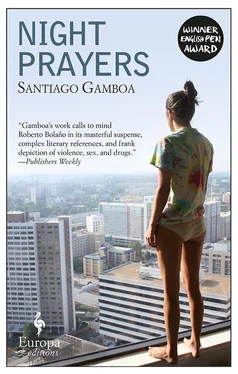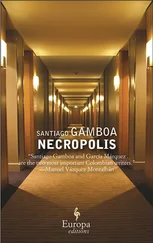The country had been saved.
Father bought bracelets with the flag of Colombia and decals that said I am a Colombian . He felt proud. My only concern was for him to stop making his speeches, so I distanced myself from all that, which deep down I didn’t care about, and devoted myself to my wall.
With my spray cans I painted another island surrounded by ocean, with protective cliffs and a little house near the shore, where I imagined Juana and I were living, and below the island, which floated like a cork, I painted dragons with huge jaws trying to swallow it, and a beautiful smoking volcano, and at the side I again put my signature, MAL, of which I was very proud, just like father with Uribe. It was the fourth time I had painted something big near the sewer, and I thought, when would I dare to paint on other walls, far from the neighborhood and my house? One way or another, going out into the city meant breaking through the protective shell of childhood.
The truth is, I was nervous.
I also started to experiment with the shapes of some letters. The S a viper of fire in the sky, biting the night. The M a mountain, the feet of a strange Martian. The U an old cabalistic sign, a horseshoe in reverse, the imminence of fire and pain. The J a seahorse because it was Juana’s letter, in other words, it meant my freedom, my hope. I foreshortened them, gave them depth and volume. Some shapes I made were kitsch, others classical. I imitated Garamond and Boldoni typefaces. I painted sunrises. I painted an image of the seabed that came to me in dreams, thick darkness with one open eye, the eye of some fish or other.
The history of the country was moving forward.
Not much time passed — a year, six months, do you remember, Consul? — before the joy of Uribe’s victory started to crack and sunlight to filter in through the cracks. As often happens, it was a few intellectuals who sounded the alarm. They criticized Uribe for behaving like a provincial Messiah, always talking about the Virgin Mary, and started alluding to his relationship with the death squads and the paramilitaries.
Father closed his ears, he couldn’t accept it. His rejection of the intellectual world became a matter of national security — as he put it — and when he saw what was happening he overflowed with justifications and reasons.
I told you! he would cry, what this country doesn’t need is that herd of pundits, and not just them, the whole mob of intellectuals who live from one cocktail to another, rich kids, idlers who spend their time criticizing the president without suggesting anything better and talking ill of the country, because let’s make no mistake about this, they’re the ones who really give Colombia bad press, what do they care? most of them come from foreign schools, they’re brought up to admire France or England or the United States, so what does it matter to them? That’s why they criticize the president and only talk about the bad things that happen here, talking about them in Europe and the United States, why do they never talk about the good things? why do they never mention the heroes of our history, or the martyrs? why don’t they say that Colombia is a power in biodiversity, in flora and fauna, that it has every possible climate and lots of greenery and clean water and blue skies? why don’t they talk about how good it is to live in Bogotá, in spite of the problems, and how great it is to have a temperate climate like the climate in Melgar or Girardot just forty minutes away? oh, no, they can’t say that because nobody’s interested, speaking well of Colombia doesn’t sell, don’t you see? that’s why they keep talking about the murderers in this country and the drug traffickers in this country and the hit men and the prostitutes and all the dead in this country, as if those things didn’t exist everywhere! that’s the truth, the sad truth, Father said whenever for some reason somebody, usually my sister, mentioned what some writer or intellectual had said against the government.
And as the years went by, he got worse and worse.
He just had to hear some name mentioned by Juana and he immediately came out with the same old story: on one side there’s us, standing shoulder to shoulder with the president, waging war on FARC and on Chávez and on all the Communists in Latin America, and on the other side there’s them, always criticizing, as if they didn’t know that what they’re saying helps our enemies, how many of those hippies are really Communists, Chavists, or even members of FARC? If they like it so much why don’t they go into the mountains or to Venezuela or Cuba! let’s see if they’re allowed to criticize things there, oh yes, I’d like to see that! If they said in Caracas or Havana half of what they say in Bogotá they’d be thrown in prison, and as most are columnists, worse still, that’s why decent people have to rally around the president, who’s an upright man and, what’s more, a believer. This country has always been Catholic, there’s nothing new about that, why does everyone criticize him when he mentions the Virgin Mary in his speeches? what’s wrong with him praying on television? It’s normal in a Catholic country, haven’t they seen how Bush goes to mass and talks about God and nobody says anything? Why keep saying that about the president? I mean, even Chávez quotes the Bible at every opportunity! It makes them angry and they criticize, but the truth is that we’ve never been better and we’ve never been respected so much in Washington.
Juana, who was already in tenth grade and had gotten used to answering back, would retort and say, what do you mean, Dad, respected? on the contrary, we’re a pure banana republic, I feel ashamed when I see Uribe going to Washington to show the figures for the Free Trade Agreement, which they’re never going to agree to while he’s president, and you know why? because there they have reports about crimes, about the State’s responsibility for massacres, reports they compiled themselves, or do you think the gringos rely on our local columnists to judge Colombia?
Father would lose his temper and say, what crimes of the State, no way, since when is fighting terrorism a crime? If the gringos had allowed the same NGOs in Iraq or Afghanistan that they’ve set up here, they’d all be in prison, from the Secretary of Defense down, but that’s because the terrorists, how shall I put this? aren’t students throwing Molotov cocktails, that’s why the army has to act like any other army in the world and when that happens there are always victims, so what? Whatever those idiots you read say, nothing is happening here that hasn’t already happened in all the countries where there’s ever been a war, but because it’s us, we’re asked to do it with surgical gloves on.
Daddy, you’re a fascist and a paramilitary! Juana would yell, like most people in this damned country, what a dumb country! gross!
Then she’d grab her jacket and go out, slamming the door, simultaneously with Mother crying, what a rude girl! but Father would intervene, leave her, Bertha, she’s always trying to pick a fight, these teenage years of Juanita’s will be the death of us, but we have to understand her, let her go for a walk and calm down, when you’re young you’re rebellious and you like to argue.
I’d sit there, glued to my chair, wishing I could take out my watch and freeze them, and as soon as I had the chance, I’d creep up to my room, grab a book, and start reading fervently, as if those signs were magic words that could take me out of that place and carry me far away, forever.
When I turned fifteen, Father and Mother decided to throw a party, and although I begged them not to, they insisted on inviting the family and a few friends. You wouldn’t believe they did it for me, Consul, obviously not; it was for them, to satisfy that ridiculous social fiction that obliges people to celebrate their children’s fifteenth birthdays. Juana had a study trip and couldn’t cancel it, so I was going to be on my own. As they wanted me to have friends of mine there, I asked Víctor, the guy from the block, because I refused to invite any of my classmates from school.
Читать дальше












